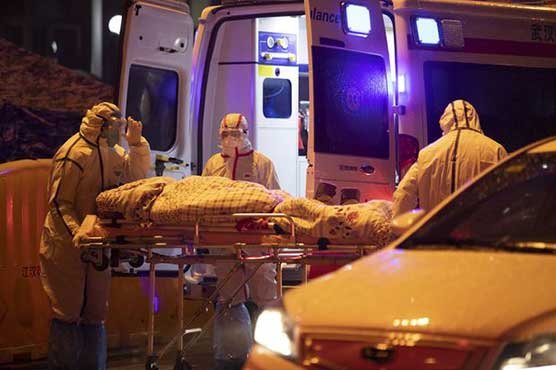Europe's virus death toll passes 140,000

Europe is the hardest-hit continent with 1,495,293 confirmed cases and a total of 140,096 deaths
PARIS (AFP) - The death toll from the coronavirus pandemic in Europe passed 140,000 on Friday, according to an AFP tally at 1740 GMT compiled from official sources.
Europe is the hardest-hit continent with 1,495,293 confirmed cases and a total of 140,096 deaths -- out of 234,987 worldwide.
The European countries with the highest death tolls are Italy with 28,236, followed by Britain on 27,510, Spain 24,284 and France 24,594.
Spain confirms pandemic slowdown
Spain registered 281 deaths from coronavirus in the past 24 hours, bringing the total toll to 24,824, confirming the slowdown in the pandemic, according to figures released on Friday.
On Thursday, the death toll reached its lowest since March 20 with 268 deaths.
But the news was soured by controversy as hundreds of people failed to observe social distancing rules as they attended the Madrid authorities closure of a large field hospital set up at the city s conference and exhibition centre.
The venue had treated thousands of COVID-19 patients since March.
The facilities will remain in place, however, just in case a second wave of the virus emerges.
But there was consternation notably on social media after the closure drew a crowd of people -- politicians, journalists and health workers -- who gathered without any visible sign of social distancing.
Images showed participants, albeit most at least wearing masks, in close proximity and posing before a sea of photographers jostling for position.
One video emerged of Madrid regional president Isabel Diaz Ayuso of the conservative Popular Party giving an accolade to a man who was not wearing a face mask.
UK virus toll rises 739
Meanwhile, Britain s overall death toll from the coronavirus outbreak rose by 739 to 27,510, as new data indicated that people in disadvantaged areas were worse hit. The increase came as Health Secretary Matt Hancock announced the country had met its goal of achieving 100,000 tests a day by the end of April.
A total of 122,347 tests were achieved on Thursday, he told a daily briefing about the government s response to the pandemic, calling the increase an "incredible achievement".
"The testing capacity that we ve built together will help every single person in this country," he said. "Testing is crucial to suppress the virus."
The 100,000 target had looked out of reach at the beginning of the week, when only 43,000 people were being tested per day despite a capacity for 73,000.
Friday s number includes thousands of home testing kits that have been sent in the post but not yet returned. The minister paid tribute to delivery companies including Yodel for helping to send out the tests.
The government has faced weeks of criticism, particularly from health and social care workers, who say they have been unable to get tests despite dealing with COVID-19 patients.
It also faced a backlash for not including deaths in care homes and the wider community in official statistics, forcing a change on Wednesday.
Prime Minister Boris Johnson said on Thursday that Britain was "past the peak" of the outbreak, and that wider testing would be key to keeping transmission rates down.
Hancock said testing would also be crucial to lifting stringent lockdown measures imposed in late March and restoring social and economic freedoms.
Death and deprivation
Hancock also said the government was concerned about Office for National Statistics (ONS) figures about the effect the virus has had on more deprived parts of the country.
The virus has had a disproportionate impact on black and ethnic minority communities, the elderly, men and the obese.
The ONS earlier revealed that areas of England with the worst rankings for income, health, education and crime, suffered 55.1 deaths per 100,000 people due to COVID-19.
That compared to 25.3 per 100,000 in the least deprived areas.
"This is something that we re worried about," Hancock said.
"We re... trying to understand the impact of the virus as much as we possible can as and when we get new evidence."
According to the ONS, general mortality rates involving all causes of deaths, including COVID-19, were 88 percent higher in the most deprived areas than in the least.
But when looking at the impact of deprivation on COVID-19 mortality, the rate in the most disadvantaged areas of England was 118 percent higher than in more well-off locations.
"People living in more deprived areas have experienced COVID-19 mortality rates more than double those living in less deprived areas," said Nick Stripe, ONS head of health analysis.
The ONS figures, which analysed deaths between March 1 and April 17, confirmed London was the epicentre of Britain s outbreak, which is the second worst in Europe behind Italy.
Complex picture
The capital had the highest mortality rate in the country, with 85.7 deaths per 100,000 people involving COVID-19.
This was more than double the next highest area, the West Midlands -- which includes the city of Birmingham -- where there were 43.2 deaths involving coronavirus per 100,000 people.
The east London borough of Newham was worst hit, with 144.3 deaths per 100,000 people.
London and Birmingham are the most diverse areas of Britain, a fact that has been used to explain why ethnic minorities have been particularly affected by the outbreak.
But a new study by the Institute for Fiscal Studies (IFS) think tank on Friday suggests a more complex picture.
It notes that most minorities are younger on average than the general population, so should be less vulnerable.
But "after stripping out the role of age and geography, Bangladeshi hospital fatalities are twice those of the white British group, Pakistani deaths are 2.9 times as high and black African deaths 3.7 times as high", it said.
"Bangladeshi men have high rates of underlying health problems, and black Africans and Indian men are particularly exposed to the virus due to their prevalence in healthcare roles."

